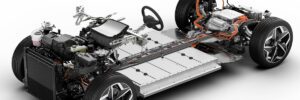
Hurricane-force winds are blowing through the global auto industry, and we may just have seen the first roof fly off.
German carmaker Volkswagen has announced that it plans to close at least three factories in Germany, for the first time in the company’s history. According to the company’s works council, VW is also expected to lay off thousands of workers, impose major pay cuts, and abolish a 30-year-old employment protection agreement.
“The board wants to close at least three factories in Germany,” Daniela Cavallo, Chairwoman of VW’s works council (roughly analogous to a labor union in the US), told employees at VW’s headquarters in Wolfsburg. “All German VW plants are affected by these plans,” she added. “None is safe.”
As far as we know, VW has not specifically cited electrification as the cause of the impending cuts, but there can be no doubt that the automaker’s failure to position itself as a leader of the transition is near the root of the problems. In 2022, Chief Executive Herbert Diess warned that moving too slowly to transition to EVs would endanger the company, but he was forced out as the bearer of bad tidings.
Of course, multiple factors are at work. Europe’s largest economy is struggling, total auto sales are in decline, and EV sales haven’t grown quickly enough to pull the automaker through the Valley of Death. (Germany’s foolish decision to end its EV subsidy program certainly hasn’t helped.)
European automakers are experiencing not one, but three major storms emanating from China. Global automakers have already been blown out of the once-lucrative Chinese auto market, and secondary markets in places like South America, Southeast Asia and Africa are experiencing a storm surge of cheap Chinese exports. Meanwhile, a Cat 5 typhoon is about to hit Europe itself, as Chinese automakers blow into town with good-quality EVs at prices that domestic brands can’t match.
Germany does have some storm-mitigation resources that may come into play. The country’s works councils are generally more powerful than (for example) auto workers’ unions in the US, and in some cases large employers (VW employs some 120,000 people in Germany) are partly owned by regional governments. The state of Lower Saxony, where a plant in Osnabrück is threatened with closure, is Volkswagen’s second-largest shareholder.
Cavallo has raised the prospect of industrial action, saying that the company is “playing with the massive risk that everything will soon escalate here,” and that workers will “do what a workforce has to do when it fears for its existence.”
Political and labor action may cushion the job losses (in September, Germany implemented a modest tax break for company EVs), but of course in the long run, the only way forward for legacy automakers is to start building EVs that can compete with Chinese models.
The roof in Wolfsburg may be the first to take flight, but every global automaker is in the storm’s path.
Sources: The Guardian, Electrek
from Charged EVs https://ift.tt/wK5NXkW


No comments:
Post a Comment